The Swiss Surgeons in Ethiopia Foundation was founded in 2009 by Dr Jörg Peltzer together with Swiss surgeon friends.
Jörg Peltzer has been involved in trauma surgery in south-west Ethiopia since 1999. The lack of access to medical care for the rural population prompted Dr Peltzer to help these people. In 2006, he opened the first trauma surgery centre in the whole of Ethiopia at the university hospital in Jimma. The foundation runs the trauma surgery centre established by Jörg Peltzer and, together with the University of Jimma, implements the trauma surgery training programme called GO STAR.
Sustainable development of trauma surgery is only possible if our knowledge is passed on to local specialists with the aim that they will one day be able to continue the project under their own responsibility. The proximity to the University of Jimma and the University Hospital offers an excellent opportunity to inspire young prospective doctors for our work and to train them in trauma surgery with a high level of practical relevance.
An orthopaedic workshop is also integrated into the GO STAR project, where various types of walking aids (footwear, orthoses, prostheses) are manufactured and customised.
The trauma hospital is developing into a flagship project for the whole of Africa. Today, over 200 injured patients are treated in the trauma surgery centre every day and over 1,500 complex operations are carried out.
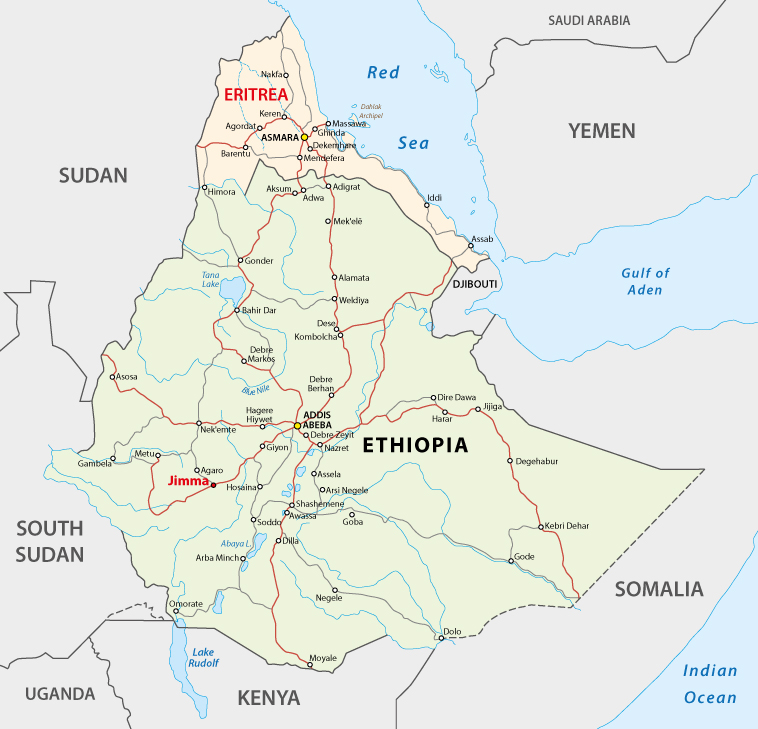
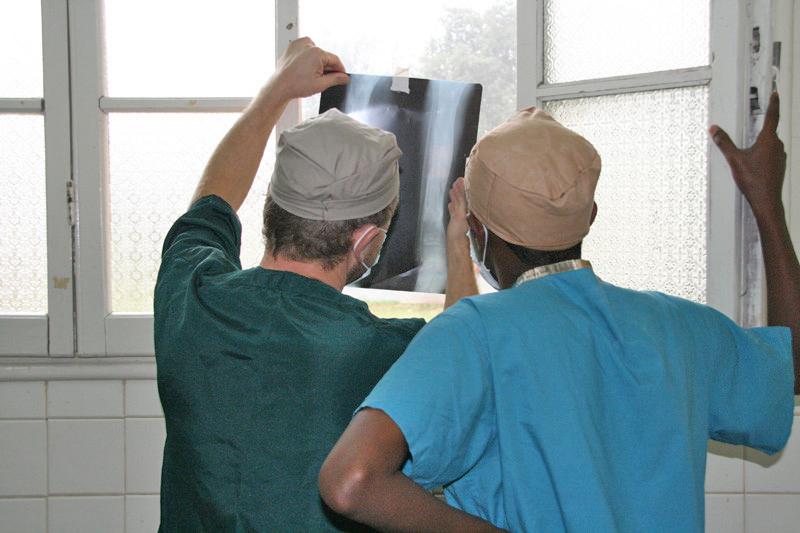
Traumatology of the musculoskeletal system deals with injuries to bones, joints, ligaments and muscles caused by an accident. Clinical examinations and diagnostic imaging are used to analyse the injury pattern and initiate appropriate treatment. Traumatology includes both conservative, i.e. non-surgical, treatment strategies as well as surgical and reconstructive methods with the aim of restoring the anatomy and function of the injured limbs.
Medical care in Ethiopia is rudimentary in most places. Initial care for sick and injured people is provided by nursing staff in local, often poorly equipped health centres, the "District Health Stations". More difficult cases are referred to the nearest centre hospital, where the patients are first medically assessed, treated and, if necessary, surgically treated. These district hospitals are usually the only medical point of contact for several million people in the respective district.
80% of the population live 40 kilometres or more from the nearest road, which means that medical help often arrives days too late: in over 90% of emergencies, often "simple" cases such as appendicitis or a trapped hernia, people die from complications before they reach the hospital.
Reaching the hospital does not guarantee timely and appropriate treatment. Ethiopian hospitals are permanently overcrowded and the medical care capacity is inadequate. Patients often have to wait for hours or even days in endless queues. It is highly uncertain when the initial medical assessment and any hospitalisation will take place and there are often extreme delays.
People's trust in the local healthcare system is correspondingly low; the general uncertainty is palpable and the fear of amputations and incorrect treatment is omnipresent.
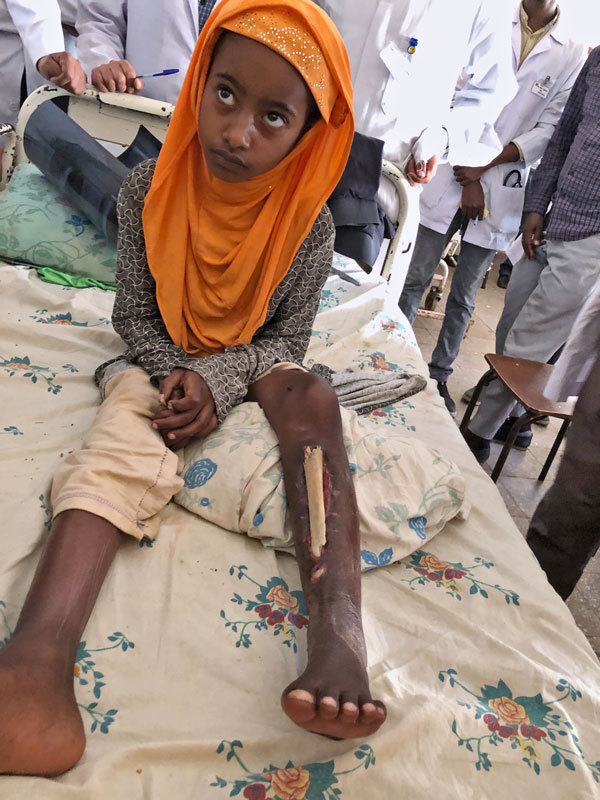
"Those who endeavour to seek their own happiness are also happy to help others to do so." Sebastian Kneipp
For our bone and trauma surgery, we have an operating theatre, 80 beds in the new department and a further 40 in the old department, as well as many in the emergency ward.
The outdated infrastructure, water and power failures and the lack of the simplest hygiene and sterilisation rules, as well as the unusual accident and disease patterns for our doctors, present the surgical team with new challenges every day.
The Swiss-Ethiopian team performs the most demanding bone surgery and emergency operations. The young Ethiopian surgeons and medical staff receive practical training and are given increasing autonomy.
Today, the trauma surgery centre treats over 200 injured patients per day and performs over 1,500 complex operations per year. In addition, around 100 amputations per year can be prevented.
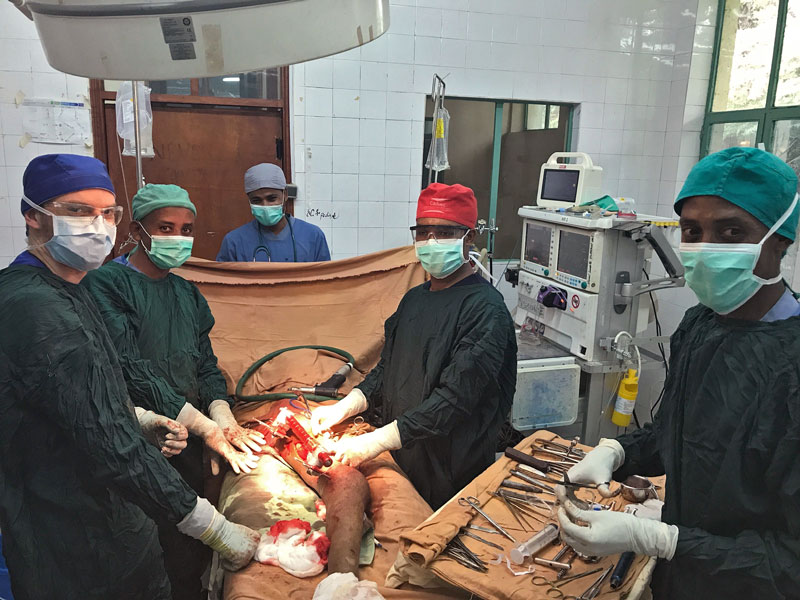

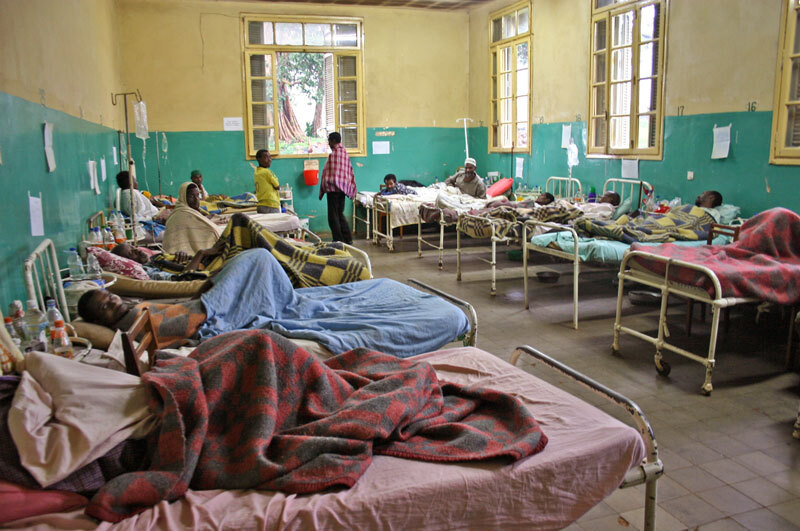
There is a nationwide lack of expertise, technical facilities and surgical equipment for treating accident victims. Water and power outages are commonplace, slowing down the rhythm of work in hospitals and making it difficult to comply with the simplest hygiene and sterility rules.
In the overcrowded surgical departments, patients with bone injuries often hang on stretching devices for months. There is no treatment concept for the mostly open, infected bone fractures and complex soft tissue injuries and therefore little hope of healing. In order to save the patient's life, amputation is often unavoidable.
Every day, doctors have to prioritise the urgency of their patients' treatment. Due to the limited bed and operating capacity in the trauma centre, not all patients can be offered adequate treatment. Only the most urgent cases can be considered. Carrying out this so-called triage on a daily basis is one of the greatest challenges of the humanitarian mission of the Swiss surgeons on site.
The trauma surgery department with its 60 beds is the centrepiece of patient care. A team of over 20 people is responsible for preparing patients for surgery, daily wound care and dressing changes as well as physiotherapy.
"Today, surgeons are operating in Ethiopia under difficult conditions."
Doctors, medical students, nursing staff and physiotherapists look after the patients together. In order to achieve a routine in the entire process, the function and tasks of each individual in the team must be regularly trained and monitored. Good and continuous aftercare enables rapid wound healing with quick recovery of mobility and discharge of the patients. This means that check-ups can be carried out on an outpatient basis and the limited number of beds are once again available for the treatment of waiting acute patients.
Good and trustworthy contact with family members is of central importance to our team, as they play a key role in the co-care and further care of patients.
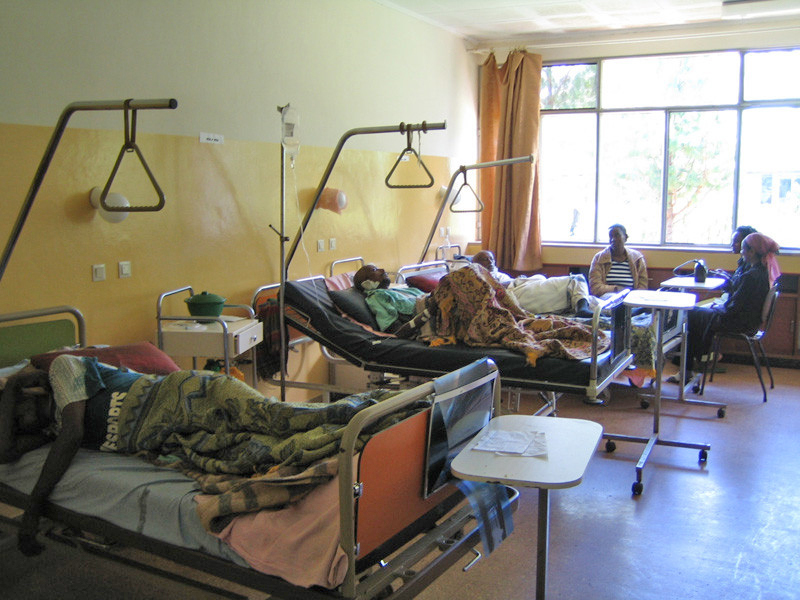
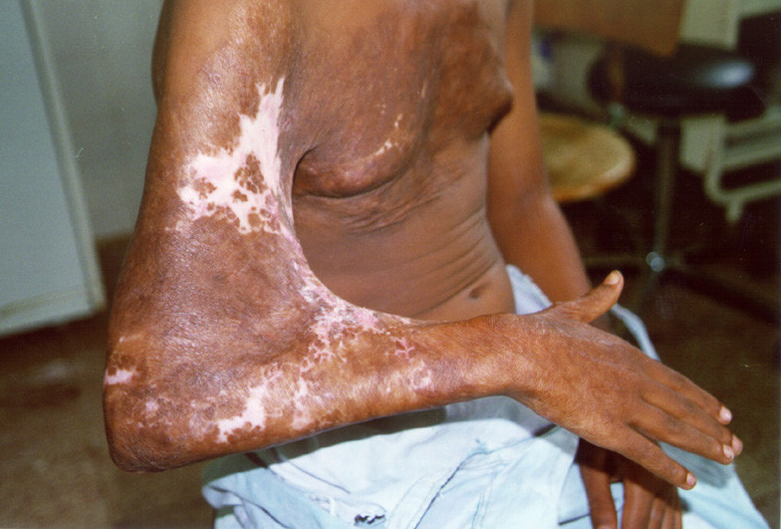
Around 200 patients attend the general surgery consultation at Jimma University Hospital every day. The reasons for seeking medical help vary: poorly healed broken bones after falling from a tree, infected, festering wounds after a snake or hyena bite, severe soft tissue injuries caused by machetes and spears, grotesque deformities or severely restricted tissue contractures after burns.
Most of these are complex, missed, ignored or mistreated cases with a long history of suffering. Accident victims visit the hospital in the hope of a cure and thus a speedy return to life as an able-bodied member of the family and community.
"You have to live for others if you want to live for yourself." Latin wisdom
The rehabilitation and reintegration of physically impaired patients into everyday life is an important concern for us. Our physiotherapists teach patients how to use walking aids, enabling them to return to their families as soon as possible. The periodic assessment of patients gives us the certainty that they are being used correctly in everyday life, enabling them to achieve the desired mobility despite their limitations.
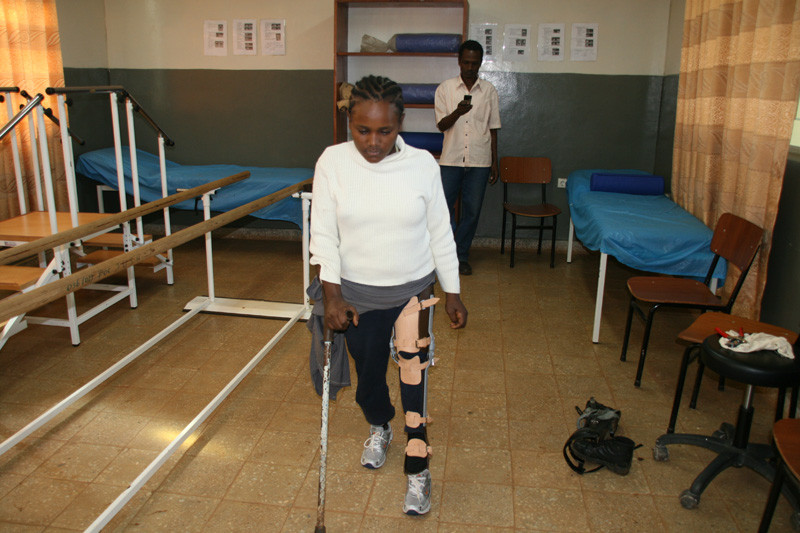
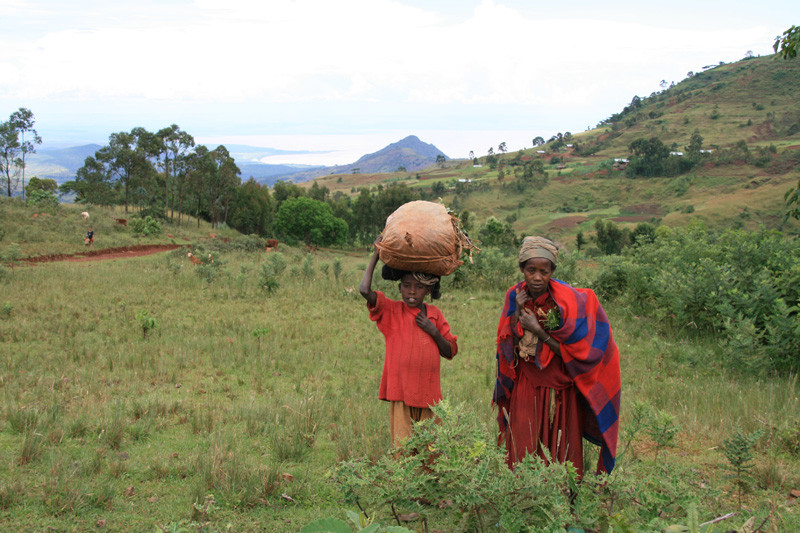
The consequences of the desolate state of the healthcare system can be found in every village. A not inconsiderable proportion of the population is severely impaired by a permanent disability caused by an accident, is no longer able to support the family and is socially disintegrated. Particularly serious for an African family is the loss of the wife and mother, who are responsible for the central tasks of providing for the family. Ethiopia's development is slowed down by the high proportion of people who are crippled and therefore unable to work. The situation can be improved with suitable trauma surgery concepts. In many cases, recovery is possible with the help of correct surgical treatment.
"80% of the population live 40 kilometres or more from the nearest road and therefore often a day's journey from the nearest hospital."
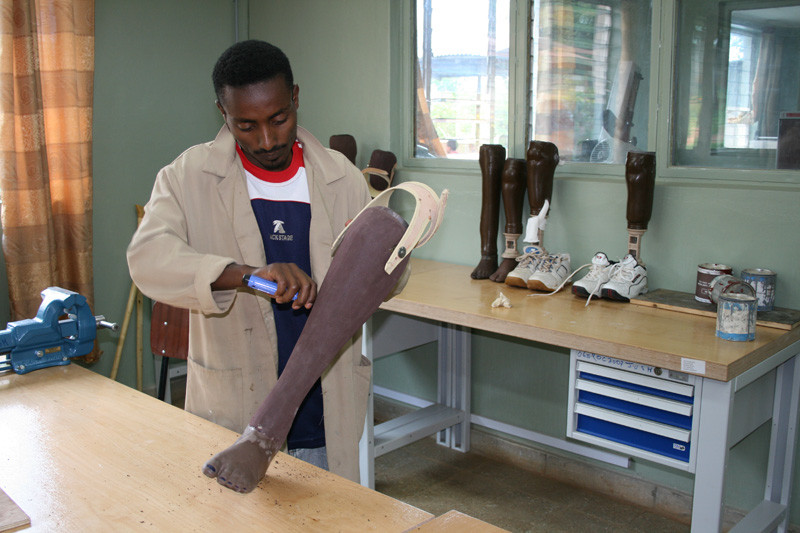
Another important pillar of the GO STAR project is the reintegration of physically disabled patients into everyday life. In the Prosthesis and Orthesis Centre (POC) - the orthopaedic workshop - patients are cared for and apprentices are trained.
The equipment used to produce prostheses meets European standards and enables the manufacture of high-quality lower and upper leg prostheses, each individually customised for the patient.
The waste products from prosthesis production are recycled and used to manufacture crutches. In the future, the POC team would like to take on a new challenge: the production of wheelchairs for around 150 francs each.
In our Ethiopian workshop, we produce lower and upper leg prostheses customised to the individual patient. The POC team also produces special shoes for people with foot deformities, which are common in Africa as a result of polio. The waste products from the production of prostheses are recycled and used to make crutches.
The foundation has a major impact by supplying the hospital with important high-tech materials such as implants, screws, nails, fixators, drills and instruments, which are not available in Africa. We are also involved in the construction and maintenance of new medical facilities and organise seminars and conferences to promote trauma surgery in Ethiopia.
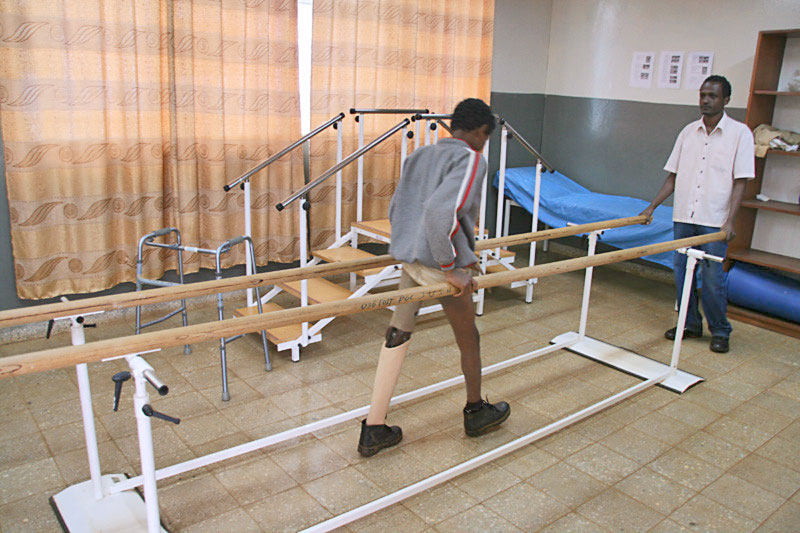
"Those who endeavour to seek their own happiness are also happy to help others to do so." Sebastian Kneipp
Teaching and knowledge is the key to sustainability for us. The training and further education of all those involved in patient treatment, from trainee Ethiopian surgeons to operating theatre and nursing staff, is part of our daily work. The aim is to achieve a sustainable improvement in trauma surgery care in Ethiopia. This can only be achieved if specialised knowledge and manual skills are taught locally under local working conditions and manual skills are developed together with the Ethiopian specialists. We want to enable young, motivated people to have an attractive and interesting professional life in their rural environment.
Training usually takes place in direct exchange during daily work, but also in the form of organised practical courses, literature made available and case discussions via the Internet. Surgical expertise and knowledge of hygiene and sterility are imparted and the most appropriate procedure, the correct approach and the necessary follow-up measures are discussed and determined for each individual case. Wherever possible, operations are carried out by the Ethiopian doctors in training under the supervision of their Swiss colleagues in order to acquire manual skills and knowledge of new surgical techniques in the most interactive way possible.

"We want to inspire potential doctors for our work, train them in modern trauma surgery and give them career perspectives at our hospital."
GO STAR | Swiss surgeons in Ehtiopia
c/o Luzerner Kantonsspital
Spitalstrasse 16
CH-6000 Luzern
Postal account 60-334455-9
IBAN CH62 0900 0000 6033 4455 9